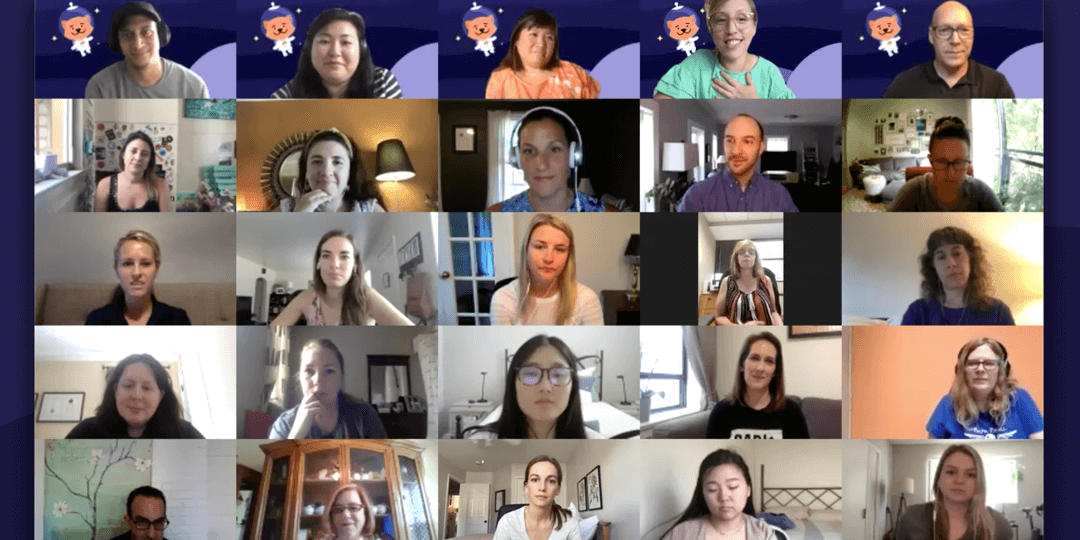Company core values have the power to shape the employee experience and your employer brand — and at a time of social, political, and economic turmoil, they take on added importance. But without the right approach, they can ring hollow or just be forgotten.
At Lattice’s Resources for Humans Virtual Conference, HR leaders shared their advice for making values a more meaningful, tangible part of the employee experience. To watch a recording of the session, click here.
1. Keep your values specific.
When writing down company values for the first time, it’s tempting to go big. Though punchy values like “ownership” or “community” look good on paper, they’re short on context. According to Nathalie McGrath, co-founder of The People Design House, it’s essential to get specific about what values like these actually mean — especially since you’ll be using them to evaluate job candidates and employees during performance reviews.
“You would be amazed how different everyone's interpretation of one single word can be. And so the key is to provide as many examples, bullet points, and [incorporate] storytelling as you go through it, so that folks can get along and get on board,” McGrath said.
If you’re having a hard time spelling your values out, interview company leaders first. What’s “clear communication” really mean at your company? Getting their buy-in and consensus early on makes it easier to incorporate your values into performance conversations in a way that’s more equitable and objective.
“Start with leadership: Tell us about your star performers. What are the values or the behaviors that they're doing? Because often, they're going to reinforce certain behaviors...So then you can actually put that in your performance review process,” McGrath said. These examples are important to include on interview and performance review scorecards, as they help provide greater context for interviewers or managers.
2. Hold yourself accountable.
Just as you might track progress toward conventional goals and OKRs, your company needs to hold itself accountable to its values. That was the advice of Khalilah "KO" Olokunola, EVP of Human Resources at TRU Colors Brewing. She urged HR teams to view their mission and values with the same seriousness reserved for metrics like revenue, arguing you couldn’t really be considered successful without doing so.
“You have to measure both the mission and the money, because, without the money, you can't sustain the mission...But if we're making money and our mission is still faltering, then we're failing as a company,” Olokunola said. “You have to look at how one connects to the other. It really can't be separate. And for us, it is not.”
TRU Colors Brewing’s mission is to stop gang violence and unite communities. To that end, Olokunola’s team maintains a dashboard that tracks shootings in local neighborhoods. If violence hasn’t decreased by 10% or 15%, her team views that as a failure. “Programs are great, but you need something in place that's going to help you sustain the mission. The return on investment that my CEO looks at is going to always be money. But for me, I'm looking at the social return on investment,” Olokunola said. Tying your mission and values to something measurable has the effect of making them feel less like platitudes and more like real, tangible objectives.
3. Revisit your values as needed.
While you shouldn’t compromise on your values, that isn’t to say they shouldn’t be subject to change. If they’re mismatched to your culture or state of the business, employees won’t take them seriously. In 2018, Nicole Miller, Manager of People Operations at Buffer, went through the process of updating her company’s core values for the first time. Buffer had long since made the transition from plucky startup to “scaleup,” and its old values just didn’t fit the company’s reality. There were also ten of them.
“We realized that if you can't necessarily remember all of your values, it's probably too many,” Miller said.
Over several months, Miller interviewed employees, asking them to identify which behaviors or qualities they associate with Buffer. She also asked them to identify where the company was falling short. “You want your values to be both reflective and aspirational...We spent about six months talking with our teammates, asking them about behaviors they’re seeing, whether our company is reflecting those, what they thought of the current values, and what each of them meant.
After over thirty interviews, 200 pages of notes, and five drafts, Miller unveiled the new values at a company retreat and wrote about them on Buffer’s blog. But even after all that work, she’s not ready to call the values a fait accompli.
“I don’t ever view our values as ‘done,” Miller said. Regularly talking about what your values mean — and whether they need changing — also has the added effect of keeping them top of mind. “That was a really, really beneficial exercise. And we're essentially preparing to do another round of this...Because the other thing is you don’t want to put your values up on the wall, even a virtual wall, and forget that they're there.”
—
To watch a recording of this and other sessions from Resources for Humans Virtual, click here.







